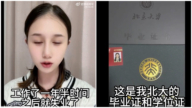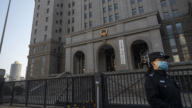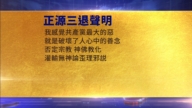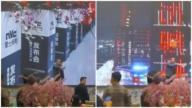【新唐人2012年3月13日訊】中共原中紀委副書記劉錫榮在人大浙江代表團會議上,公開批評中共官員「嚴重超編」等諸多現狀,他說老百姓再勤勞、也養不起這麼多官員,他建議立法進行管理整頓。分析指出,劉錫榮作為人大代表只是在團會上建議立法,一個不在位的原紀委書記在這種情況下談立法,等於空談。
3月10號,劉錫榮在中共人大浙江代表團會議上批評中共官員嚴重超編。他說中國當前「亂設機構,亂定級別」,沒有「編製法」,給「買官」、「賣官」留下了無限的空間。
他舉例說,一些鄉鎮好幾百個幹部,小汽車停了好幾排。一些地方政府秘書長有幾十個,每個秘書長都要給房子、配汽車,而這些支出最終都是老百姓買單。
他說,「老百姓再勤勞,也養不起這麽多官啊!」中國公務員人數已從4年前的600多萬,增加到1000多萬,平均每年增加100萬人。
前「山東大學」教授孫文廣指出,中共官員編製上沒有法律、沒有監督,官員們都想多拉幾個人進入官場,自己人多了好辦事。
孫文廣:「中國這個官員人浮於事,大家都看在眼中啊,這是個事實,你到一些機關去看,這些當官的非常空閑,沒有多少事情要處理,為甚麽要設那麽多職位呢?就是共產黨腐敗的表現之一。就是任何人當了一個縣委書記或省委書記,那麽他希望收集一些人,中國的機關又沒有一個很嚴格的法律,就是說編製到底應該有多少?這個限制裡沒有規定,所以這樣的自然就起來,越膨脹。」
孫文廣認為制定一個「編製法」是必要的,也是大多中國民眾的呼聲。
孫文廣:「有的縣裡,一個縣裡邊啊,教育局副局長能有8、9個之多,這是常有的事啦,這種都是它們腐敗的一種表現,我覺得制定一個「編製法」這個還是有必要的,否則的話,它必然要膨脹。」
劉錫榮力薦將政企分開、政資分開、政事分開、政府與市場中介組織分開。他說,目前這「四不分」是中國諸多問題的根本來源。他建議出臺《反集體腐敗法》、《編製法》和《國民收入分配法》等。
大陸老記者鐵流指出,劉錫榮不在位了才提出建立「編製法」,等於空談。
老記者鐵流:「你發聲又怎麽樣?人一走茶就涼,一下來說話就不起作用了,在臺上又不敢說,下來了說又等於沒說,這是中國的現實。」
劉錫榮還建議將審計署從大陸國務院劃分出來給人大直接管轄。他指出,審計署和中紀委合署辦公,自己人審自己人是審不出名堂的。
獨立候選人姚立法指出,劉錫榮做為人大代表,卻只是在浙江代表團會議上提出建議根本不會有實質效果。
姚立法:「他並沒有真正有按照法定和程序行使他的權力,他只是在代表團會上發言的時候 , 說說而已,這樣它不能產生很大的效應,更不可能形成一股力量。所以說,近日兩會不會有實質性的效果。」
孫文廣指出,目前中共公務員增速之快,增數之多,令人震驚,如果再不實施這個「編製法」,必然還會繼續膨脹,這絕非國家和人民之福。
新唐人記者採李韻、柏妮采訪報導。
Establishment of Organisations Law Recommended:
Civil Officials Overstaffed.
Liu Xirong, former Deputy Secretary for Chinese Communist
Party (CCP) Central Commission for Discipline Inspection,
said in a Zhejiang delegation meeting that CCP officials are
seriously overstaffed.
He stated that no matter how hardworking, the public still
couldn’t afford to feed so many officials. Liu suggested legislatures to take action.
Analysts said Liu, who is no longer in his former post,
discussed legislation on a delegation-level, as chit-chat.
On March 10, in the Zhejiang delegation meeting of National
People’s Congress (NPC), Liu Xirong spoke.
He said that the CCP regime is seriously overcrowded with
Officials.
In addition, the current chaos reflects “casually setting up
organisations and giving official ranks”.
He said, the CCP has no “Establishment
of Organizations Law”.
The purchase and sale of official positions are
consequently rampant.
Liu Xirong said that in some small townships, there were
hundreds of cadres. We see many rows of cars in car parks.
Some local governments have tens of party secretaries,
and it has to purchase houses and cars for each of them.
All bills are paid by ordinary people in the end.
Liu said, “No matter how hardworking, the public still
couldn’t afford to keep so many officials!”
He stated that there were 6 million public servants four years
ago. Now it was increased to 10 million. One million was added each year.
Sun Wenguang, former Prof. in Shangdong University said
that the CCP has no authorised law of organisations.
It has no monitoring system. All officials want to recruit
more people, as more staff means it is easier to handle jobs.
Sun Wenguang: “The CCP officials are overcrowded, we all
can see, it is the fact.
If you walk into an office, the officials there are very relaxed,
they don’t have many jobs to do.
However, why do they setup so many titles and positions?
This reflects one aspect of CCP corruption.
Anyone in a role of secretary in county party committees,
or a secretary of a party branch, hopes to increase his staff.
There is no strict law on governmental organisations, on
how many staff should be there. There is no rule of restriction.
So naturally, the CCP’s organisations have been expanded.”
Sun Wenguang believes that it is necessary to setup a
government establishment law. This is also the voice of most Chinese people.
Sun Wenguang: “In a county, there are 8-9 deputy secretaries,
it is common place. This is a manifestation of CCP corruption.
I think to setup an “Establishment of Organisation Law” is
necessary, otherwise, staff would certainly increase.”
Liu Xirong strongly suggests to separate government function
from enterprises, investment, social undertaking, and market intermediaries.
He said the current four aspects haven’t been divided, which
is the leading cause of many problems.
He recommended launching an “Anti-Group Corruption Act”;
“Establishment of Organizations Law” and “National Income Distribution Law”.
Tie Liu, a senior journalist in China said that Liu Xirong is
no longer in the former position.
His recommendation to “Establishment of Organizations Law”
is just chit-chat.
Tie Liu: “What has happened, even you spoke out?
When a person left, the tea is cold. He has no power as soon as he left the position.
He dared not to speak out when he was in the post, but he
spoke out when he is not in the position; It is a chit-chat. It is a real China.”
Li Xirong also suggested separating the Audit Commission
from State Council, handing it over to NPC.
He said that Audit commission and Central Commission
for Discipline Inspection shares staff and offices. To inspect it’s own people won’t work.
Yao Lifa, an independent NPC representative candidate, said
that being a representative, Liu Xirong only mentioned it in Zhejiang delegation meeting. It won’t have a practical effect.
Yao Lifa: “He hasn’t exercised his rights according to
statutory and procedural law.
He just talked and gave a speech in a delegation meeting.
By this way it won’t have a great effect, nor form a power.
So the Two Sessions will have something to come out, but
it won’t have a practical effect.”
Sun Wenguang pointed out that the excessive increase
in numbers of civil staff is shocking.
If we don’t setup “Establishment of Organizations Law”,
the numbers will keep expanding.
It is definitely not a positive thing for the country and people.































